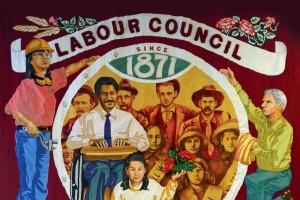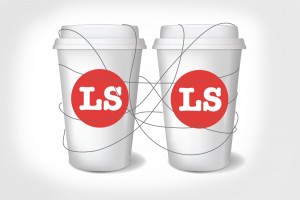For a while there when I went to parties with people I didn't know, I could usually stop the conversation any time I wanted.
It was no big deal. First I'd ask them what they did for a living. You buy and sell gold mines in West Africa?
Fascinating, I'd say. It must be so satisfying. You're a brain surgeon, really? I'm thinking of trying that myself.
Show an interest in people and usually they will at least pretend to be interested in you. That's what I've learned. Eventually, just about anyone would ask me what I did for a living. That's when I'd drop the bomb.
All I had to do, when they asked me what I did for a living, was say: "I do public relations for a union."
Silence.
When they recovered, most people would come up with one-word reactions like "Wow" or "Hmm." After a few seconds the smart ones would say, "I just need to use the facilities" or "Time for another drink" before edging carefully away.
No matter what they said, I knew what they're really thinking. They were thinking, "Wow, you must really suck at your job."
It's no secret that unions don't have a great public image. In a poll published on January 22, 2007, Ipsos Reid asked 1,000 Canadians to rank 30 occupations and organizations according to how trustworthy they thought they were. "Trade unions" ranked 27th. Only 19 per cent of Canadians think trade unions are trustworthy.
Things got a lot easier when I started telling people I was a firefighter. It's not true, but it's the best answer by far. Firefighters rank No. 1 in trustworthiness. No surprise there. The kind of people who go into burning buildings to rescue strangers aren't likely to steal our wallets or kidnap our kids. But how come unions are 27th, with only politicians and car salespeople ranked lower?
Those of us who work for unions are aware of the many accountability mechanisms that govern what we do. We've got legislation to obey, we've got audit committees to scrutinize the books, we've got authorization procedures to follow. We can certainly be trusted, trust me.
But, according to Ipsos Reid, nobody's buying it. Our image is not great.
OUR IMAGE IS NOT THAT GREAT
There are perfectly rational explanations for this. The nature of the news media is one. Media outlets play a big role in shaping our attitudes about any number of things, including unions. When I teach media relations courses to union members, I do a little exercise where we analyze a newspaper. I ask my students to scan each story and ask themselves, "Why is this story news?"
The answers never fail to enlighten. Sometimes the bias of the newspaper owner puts a story in the paper, but not always. Other things get stories into newspapers, too, and clearly because they help sell the paper. Sex sells. Hockey sells. Most of all, conflict sells. And to many news editors, "unions" fall under the heading of conflict, which means strikes.
Strikes disrupt people's lives. They're supposed to. They become necessary when employers just won't listen to working people. They are not, however, fun. People lose money. Traffic gets disrupted. Angry words are exchanged. Sometimes there's even swearing. Not exactly a great platform for improving one's image.
NOT SEXY, BUT NECESSARY
So what can we do about labour's image? First of all, relax. People might not say they trust politicians, but the majority of us still vote. Car salesmen may give us the creeps, but people still buy cars by the millions. Unions may not be sexy, but a lot of people sure think they're necessary.
Marc Zwelling runs Vector Research and Development, a polling firm based in Ottawa. He's been studying attitudes towards unions for a couple of decades now. "Nearly 80 per cent of union members would vote to have a union represent them if they had a choice in a secret ballot," Zwelling says. "A third of non-union employees would join a union right now." Not bad.
Our public image is good when we talk about our specialties. "Unions have high credibility with the public when their leaders speak out on occupational health, pensions, wages, and jobs," says Zwelling.
People who are looking to join unions, like people who are buying cars, don't focus primarily on what the newspapers say. Instead, they ask questions of people they trust: friends and family members who may be in unions already. Is your union reliable? Does your union stand up for you on the job? Do your union representatives know and appreciate the kind of work you do? These are the questions people ask. A union whose members don't answer "yes" to all these questions is a union in trouble.
"Unions do not need expensive TV commercials and PR campaigns to buff their image," says Zwelling. "Word of mouth is the most effective and powerful form of advertising there is. Unions definitely can do a lot about what their own members are saying about unions."
Good thing. Maybe I'll stop telling people I'm a firefighter.
LABOUR’S IMAGE
Back-Page Commentary
Randy Robinson works for the Ontario Public Service Employees Union in Toronto.














